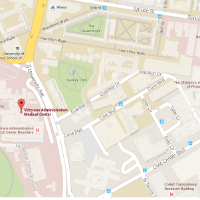
Taste Receptors
Taste receptors mediate human upper airway innate immunity
Over the past 5 years, our lab has established a contribution of bitter (T2R) and sweet (T1R) taste receptors to human upper respiratory innate immunity. In tandem publications in the Journal of Clinical Investigation (2012, 2014) we described two independent and complementary innate defense responses: nitric oxide (NO) production regulated by T2Rs expressed in ciliated cells, and antimicrobial peptide secretion regulated by T1R and T2Rs expressed in solitary chemosensory cells. Furthermore, we have also demonstrated that common functional polymorphisms of one bitter taste receptor (T2R38) alter the associated defensive response (NO production) with the clinical implications of gram-negative sinonasal infections and medically recalcitrant chronic rhinosinusitis, a disease felt to result from a genetic predisposition with an environmental insult. The implications of this last observation are tremendous, as we have identified a genetic contribution to a subset of chronic rhinosinusitis, a disease that afflicts more than 35 million individuals, generating direct medical expenses in excess of $8 billion annually.

Selected Publications:
- Adappa ND, Truesdale CM, Workman AD, Doghramji L, Mansfield C, Kennedy DW, Palmer JN, Cowart BJ, Cohen NA. Correlation of T2R38 taste phenotype and in vitro biofilm formation from nonpolypoid chronic rhinosinusitis patients. Int Forum Allergy Rhinol. 2016 Jun 16. doi: 10.1002/alr.21803. [Epub ahead of print] PubMed PMID: 27309535.
- Adappa ND, Workman AD, Hadjiliadis D, Dorgan DJ, Frame D, Brooks S, Doghramji L, Palmer JN, Mansfield C, Reed DR, Cohen NA. T2R38 genotype is correlated with sinonasal quality of life in homozygous ΔF508 cystic fibrosis patients. Int Forum Allergy Rhinol. 2016 Apr;6(4):356-61. doi: 10.1002/alr.21675. Epub 2015 Dec 17. PubMed PMID: 26678226; PubMed Central PMCID: PMC4830383.
- Adappa ND, Farquhar D, Palmer JN, Kennedy DW, Doghramji L, Morris SA, Owens D, Mansfield C, Lysenko A, Lee RJ, Cowart BJ, Reed DR, Cohen NA. TAS2R38 genotype predicts surgical outcome in nonpolypoid chronic rhinosinusitis. Int Forum Allergy Rhinol. 2016 Jan;6(1):25-33. doi: 10.1002/alr.21666. Epub 2015 Nov 12. PubMed PMID: 26562612; PubMed Central PMCID: PMC4830631.
- Farquhar DR, Kovatch KJ, Palmer JN, Shofer FS, Adappa ND, Cohen NA. Phenylthiocarbamide taste sensitivity is associated with sinonasal symptoms in healthy adults. Int Forum Allergy Rhinol. 2015 Feb;5(2):111-8. doi: 10.1002/alr.21437. Epub 2014 Dec 22. PubMed PMID: 25532854.
- Lee RJ, Kofonow JM, Rosen PL, Siebert AP, Chen B, Doghramji L, Xiong G, Adappa ND, Palmer JN, Kennedy DW, Kreindler JL, Margolskee RF, Cohen NA. Bitter and sweet taste receptors regulate human upper respiratory innate immunity. J Clin Invest. 2014 Mar;124(3):1393-405. doi: 10.1172/JCI72094. Epub 2014 Feb 17. PubMed PMID: 24531552; PubMed Central PMCID: PMC3934184.
- Adappa ND, Zhang Z, Palmer JN, Kennedy DW, Doghramji L, Lysenko A, Reed DR, Scott T, Zhao NW, Owens D, Lee RJ, Cohen NA. The bitter taste receptor T2R38 is an independent risk factor for chronic rhinosinusitis requiring sinus surgery. Int Forum Allergy Rhinol. 2014 Jan;4(1):3-7. doi: 10.1002/alr.21253. Epub 2013 Dec 2. PubMed PMID: 24302675; PubMed Central PMCID: PMC4082560.
- Adappa ND, Howland TJ, Palmer JN, Kennedy DW, Doghramji L, Lysenko A, Reed DR, Lee RJ, Cohen NA. Genetics of the taste receptor T2R38 correlates with chronic rhinosinusitis necessitating surgical intervention. Int Forum Allergy Rhinol. 2013 Mar;3(3):184-7. doi: 10.1002/alr.21140. Epub 2013 Jan 16. PubMed PMID: 23322450.
- Lee RJ, Xiong G, Kofonow JM, Chen B, Lysenko A, Jiang P, Abraham V, Doghramji L, Adappa ND, Palmer JN, Kennedy DW, Beauchamp GK, Doulias PT, Ischiropoulos H, Kreindler JL, Reed DR, Cohen NA. T2R38 taste receptor polymorphisms underlie susceptibility to upper respiratory infection. J Clin Invest. 2012 Nov;122(11):4145-59. doi: 10.1172/JCI64240. Epub 2012 Oct 8. PubMed PMID: 23041624; PubMed Central PMCID: PMC3484455.
Close
